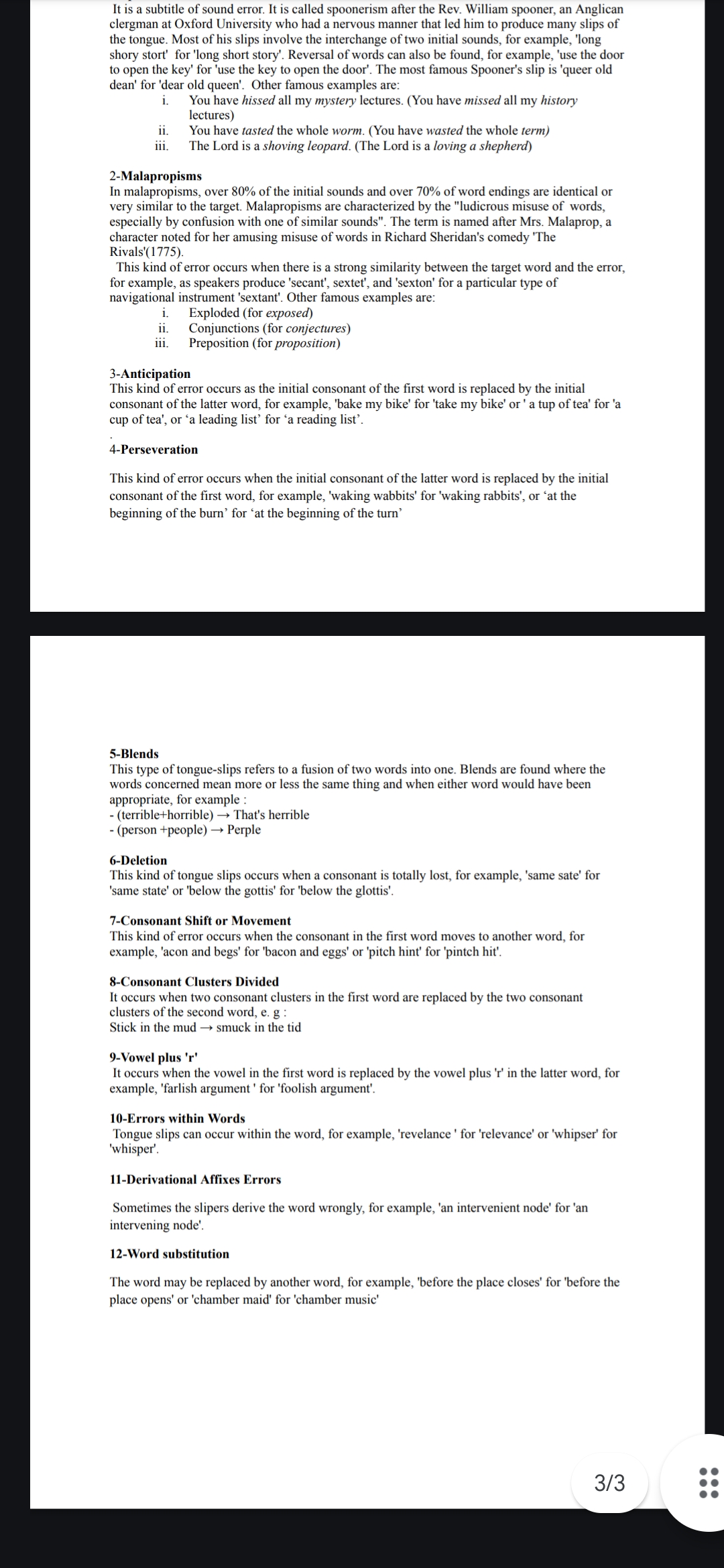Types of Language Slips: Understanding Speech Errors
Types of Language Slips

Language slips are unintentional errors in speech. Here's a breakdown of different types and examples:
1. Spoonerisms
Spoonerisms involve the interchanging of initial sounds between two words. Named after Rev. William Spooner, these slips often include swapping consonants or parts of words.
- Examples:
- "You have hissed all my mystery lectures" (instead of "missed all my history lectures").
- "You have tasted the whole worm" (instead of "wasted the whole term").
- "The Lord is a shoving leopard" (instead of "a loving shepherd").
Insight: Spoonerisms are often humorous and can highlight linguistic creativity or mental processing errors.
2. Malapropisms
Malapropisms involve the incorrect use of a word by confusing it with a similar-sounding term. Named after Mrs. Malaprop from Sheridan's comedy "The Rivals".
- Examples:
- "Exploded" (instead of "exposed").
- "Conjunctions" (instead of "conjectures").
- "Preposition" (instead of "proposition").
Insight: These errors typically arise from miscommunication rather than misspeaking, revealing intricacies in vocabulary processing.
3. Anticipation
This occurs when the initial consonant of one word is mistakenly used in the first word of a phrase.
- Example: "Bake my bike" (instead of "take my bike").
Insight: Anticipation highlights cognitive anticipation in speech production, where the brain prepares for upcoming words.
4. Perseveration
Perseveration is the repetition of a consonant from a previous word into a later word.
- Example: "Waking wabbits" (instead of "waking rabbits").
Insight: This illustrates the persistence effect in speech, where previously spoken sounds affect upcoming words.
5. Blends
Blends involve fusion of two words into one, often mixing parts of both words.
- Examples:
- "That's herrible" (from "terrible" + "horrible").
- "Perple" (from "person" + "people").
Insight: Blends mark creative word formation and often occur in informal or spontaneous speech.
6. Deletion
Deletion involves losing a consonant sound unintentionally.
- Example: "Same sate" (instead of "same state").
Insight: Deletion tends to occur in faster speech or under cognitive load, showing how efficiency impacts articulation.
7. Consonant Shift/Movement
A consonant migrates between words, causing misplacement.
- Example: "Acon and begs" (instead of "bacon and eggs").
Insight: Such shifts underline the fluidity of spoken language and challenges in sequential articulation.
8. Consonant Clusters Divided
Occurs when clusters in one word are split between words.
- Example: "Smuck in the tid" (instead of "stick in the mud").
Insight: Demonstrates the complexity of consonant cluster pronunciation and interplay during speech.
9. Vowel Plus 'r'
In this slip, a vowel is replaced by a vowel plus 'r'.
- Example: "Farlish argument" (instead of "foolish argument").
Insight: This reveals assimilation effects, where similar phonetic elements inadvertently combine.
10. Errors within Words
Mistakes within individual words alter their form.
- Examples:
- "Revelance" (instead of "relevance").
- "Whispher" (instead of "whisper").
Insight: Such errors highlight ongoing phonological encoding complexities during speech.
11. Derivational Affixes Errors
Errors in using prefixes or suffixes improperly.
- Example: "Intervenient node" (instead of "intervening node").
Insight: Misapplication of affixes uncovers morphological processing difficulties.
12. Word Substitution
Replacing one word with another related or unrelated word.
- Example: "Before the place closes" (instead of "before the place opens").
Insight: This displays semantic processing challenges, where words of similar contexts or functions are swapped.
Extended readings: